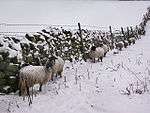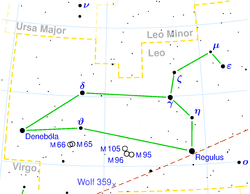Definify.com
Webster 1913 Edition
Lew
Lew
Webster 1828 Edition
Lew
LEW
,Definition 2026
Lew
lew
lew
English
Noun
lew (plural lews or lewis or leois)
Alternative forms
Etymology 2
From Middle English lew, lewe, from Old English hlēow, hlēowe (“warm, sunny, sheltered”), from Proto-Germanic *hlewaz, *hliwjaz, *hlēwaz (“warm, lukewarm”), from Proto-Indo-European *ḱal(w)e-, *ḱlēw- (“warm, hot”). Cognate with Old Norse hlýr (“warm, mild”), ( > Danish ly (“lukewarm”)), hlær, German lau, which are themselves akin to Old Norse hlé (“lee”), Danish læ (“shelter”). Compare lee.[2]
Alternative forms
Adjective
lew (comparative lewer, superlative lewest)
Usage notes
Now chiefly Southern Scottish and Northern English.
Noun

lew (plural lews)
- (now Scotland) Warmth, heat.
- (dialect) A shelter from the wind, particularly temporary structures raised by shepherds to protect their flocks.
Derived terms
- house-lew
Verb
lew (third-person singular simple present lews, present participle lewing, simple past and past participle lewed)
- (transitive) To make warm or lukewarm.
- (intransitive, obsolete) To become warm.
- (transitive) To shelter from the wind.
Etymology 3
Of uncertain etymology, but compare Old English gelewed (“weakness, infirmity”) and limlaeweo (“limb-weak, lame”).[3]
Adjective
lew (comparative more lew, superlative most lew)
Etymology 4
Interjection
lew
Derived terms
Etymology 5
Verb
lew (third-person singular simple present lews, present participle lewing, simple past and past participle lewed)
- (mining, dialect, transitive) Alternative form of lue: to sift, particularly while mining tin or silver.
References
- ↑ "† lew, n.¹" in the Oxford English Dictionary (1902), Oxford: Oxford University Press.
- ↑ "lew, adj.¹ and n.²" and "lew, v." in the Oxford English Dictionary (1902), Oxford: Oxford University Press.
- ↑ "lew, adj.²" in the Oxford English Dictionary (1902), Oxford: Oxford University Press.
- ↑ "lew, int." in the Oxford English Dictionary (1902), Oxford: Oxford University Press.
- ↑ "lue | lew, v." in the Oxford English Dictionary (1903), Oxford: Oxford University Press.
- “lew” in An American Dictionary of the English Language, by Noah Webster, 1828.
- lew in Webster’s Revised Unabridged Dictionary, G. & C. Merriam, 1913
Cornish
Etymology
From Proto-Brythonic *lew, from Latin leō.
Pronunciation
Noun
lew m (plural lewyon)
Gothic
Romanization
lēw
- Romanization of 𐌻𐌴𐍅
Polish
Pronunciation
- IPA(key): [lɛf]
Etymology 1
From Proto-Slavic *lьvъ. Probably from a Germanic language, from Latin leō.
Noun
lew m anim (diminutive lewek, augmentative lwisko, feminine lwica)
Declension
Derived terms
Etymology 2
Noun
lew m inan
Declension
Etymology 3
Noun
lew
- genitive plural of lewa
Zazaki

Etymology
From Proto-Indo-European *leb-, cognate with Persian لب (lab), English lip etc.
Noun
lew ?
